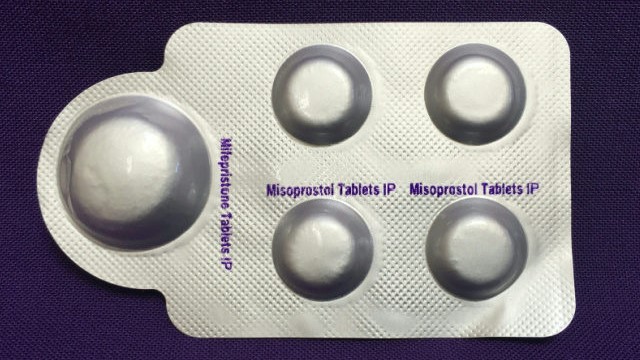The Food and Drug Administration (FDA) will allow retail pharmacies big and small to offer abortion pills in the United States under a regulatory change made on Tuesday, the New York Times reported.
According to the report:
Until now, mifepristone — the first pill used in the two-drug medication abortion regimen — could be dispensed only by a few mail-order pharmacies or by specially certified doctors or clinics. Under the new F.D.A. rules, patients will still need a prescription from a certified health care provider, but any pharmacy that agrees to accept those prescriptions and abide by certain other criteria can dispense the pills in its stores and by mail order.
Danco Laboratories and GenBioPro, the two makers of the pill, released statements saying the FDA told them about the regulatory update. The change is the Biden administration’s latest effort to ease restrictions around abortion pills.
In December of 2021, the FDA said it would permanently lift the requirement for women to obtain mifepristone in-person from a health provider, “a step that paved the way for telemedicine abortion services which conduct medical consultations with patients by video, phone or online questionnaires and then arrange for them to receive the prescribed pills by mail,” the Times reported. On Tuesday, the agency officially removed the in-person requirement from its regulatory rule book for mifepristone. The report states:
Tuesday’s action is a result of an agreement between the F.D.A. and the companies that make the pills. The agreement was worked out in negotiations that took about a year and considered issues such as whether to allow pharmacies to offer the pills in stores or only via mail order and how to keep the identity of prescribing doctors confidential to protect their privacy and safety, according to people familiar with the discussions.
The Times noted that abortion bans and restrictions in roughly half of states “would make it illegal or very difficult for pharmacies to provide abortion pills” and that the political and legal battles surrounding the issue of abortion “may influence a pharmacy’s decision about whether or not to dispense the medication.”
The FDA made the move the same day President Joe Biden’s Department of Justice (DOJ) cleared the U.S. Postal Service to deliver abortion drugs to states with abortion restrictions and bans, offering “limited assurances that a federal law addressing the issue won’t be used to prosecute people criminally over such mailings,” according to Politico.
“A legal opinion, from Justice’s Office of Legal Counsel, concludes that a nearly 150-year-old statute aimed at fighting “vice” through the mail is not enforceable against mailings of abortion drugs as long as the sender does not know that the drugs will be used illegally,” the report states.
The pro-abortion Guttmacher Institute found that mifepristone is used for more than half of all abortions in the United States. In 2020, the drug accounted for 53 percent of all abortions, up from 39 percent in 2017.
Former abortionist Dr. Anthony Levatino explained in his videos about various abortion procedures how drug-induced abortions work. The first drug, mifepristone, blocks the action of progesterone, which the mother’s body produces to nourish the pregnancy. When progesterone is blocked, the lining of the mother’s uterus deteriorates, and blood and nourishment are cut off to the developing baby, who then dies inside the mother’s womb. The drug misoprostol (also called Cytotec) then causes contractions and bleeding to expel the baby from the mother’s uterus.
Abortion advocates celebrated the FDA’s move, NARAL Pro-Choice America President Mini Timmarajtu commending the FDA for supposedly “following the science.”
Timmarajtu said in a statement:
We applaud the FDA for following the science and taking this much welcome step to permanently lift the in-person dispensing requirement for medication abortion care and expand access through pharmacies. For more than 20 years, millions of people have used medication abortion. It is a safe, effective option.
With abortion access being more restricted now than ever before, it is all the more important that we continue expanding access to care. This was a science-based decision that will empower folks to get the care they need in the way that best works for them. We look forward to continuing our work with the Biden administration to restore the right to abortion and expand abortion access for all.
President of Planned Parenthood Alexis McGill Johnson called the move a “positive step forward and a win for health equity.”
But pro-life advocates and doctors contended the move will allow for more life-threatening pregnancy complications to go undetected. Christina Francis of the American Association of Pro-Life OB-GYNs recently told Aleteia that women who do not see a doctor in person risk taking abortion drugs with an undiagnosed ectopic pregnancy:
I can tell you from personal experience caring for women who have ruptured ectopic pregnancies that within just a few hours they can go from feeling fine to being in hemorrhagic shock and facing death, so if you get this delay in care because she’s sitting at home thinking ‘Oh, they told me I was going to have some pain; they told me I was going to have some bleeding, and it’s all very normal,’ she doesn’t seek care.
A November 2021 study published by the Charlotte Lozier Institute, the research arm of the Susan B. Anthony List, found drug-induced abortion is “consistently and progressively associated with more post-abortion emergency room visit morbidity than surgical abortion.”
“There is also a distinct trend of a growing number of women miscoded as receiving treatment for spontaneous abortion in the ER following a chemical abortion,” the researchers concluded.
The study determined chemical abortion visit rates increased by 507 percent between 2002 and 2015, the same period of time during which the surgical abortion visit rate rose 315 percent.
Carol Tobias, president of National Right to Life, released a statement saying “the abortion industry wants to put at risk perfectly healthy mothers who are pregnant with perfectly healthy babies.”
“Terrified and in pain, a woman may seek help at the emergency room but help there may be hindered. Some abortion supporters have recommended that women conceal from emergency room personnel their use of mifepristone and misoprostol, placing a woman further in danger,” she continued.
Scott Fischbach, National Right to Life’s new executive director, said:
I’m not sure retail pharmacies will consider this a sound business risk to be selling dangerous abortion pills that can put women in the hospital. I don’t believe their customers will be happy to find out that their local drugstore where they get their life-saving medicines is now stocking and distributing pills for the purpose of killing unborn children in their community.
SBA Pro-Life America accused the Biden administration of valuing “abortion industry profits over women’s safety and unborn children’s lives.”
“Abortion activists want to turn every post office and pharmacy into an abortion business, and the Biden FDA is a willing participant – even while studies show emergency rooms are being flooded with women suffering from serious, life-threatening complications caused by abortion drugs,” said SBA Pro-Life America President Marjorie Dannenfelser. “Chemical abortion pills can cause dangerous complications including hemorrhage and infection, and complications are more likely when pills are dispensed without medical screening or follow-up care.”


